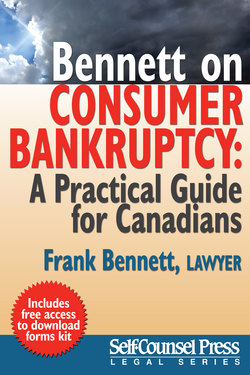Читать книгу Bennett on Consumer Bankruptcy - Frank Bennett - Страница 6
На сайте Литреса книга снята с продажи.
2. Read This Book First!
ОглавлениеMany people who go through the bankruptcy process do not need to consult a lawyer. Their affairs are neither technical nor complicated. These types of debtors are generally employees who lost their jobs through plant closures, business bankruptcies, receivership, or for other causes, and they are now unable to service the monthly debt to credit card holders such as VISA, MasterCard, and American Express, and to pay the mortgages on their homes.
However, if there are more serious financial problems which the debtor can identify from the list in section 3., and the debtor falls within one or more of them, then it is advisable to see a lawyer first. Once the debtor files for bankruptcy, the debtor is technically in bankruptcy and except in the rarest of cases, the debtor will not be able to reverse the process. If the debtor has any doubts about going into bankruptcy, again the debtor should see a lawyer first. The debtor should not sign any bankruptcy papers unless the debtor is satisfied of the consequences and is prepared to deal with them once in bankruptcy.
After seeing a lawyer, the debtor may have other remedies available to resolve the financial difficulties at which time the debtor may elect not to file for bankruptcy. This decision as to whether to file for bankruptcy is critical as once the debtor files for bankruptcy protection, the date becomes a focal point for many objectives under the Act. These are discussed throughout the book.
Lawyers are generally not able to list themselves in the telephone directory or advertise to the public by specialty or expertise unless they are certified as such experts by their provincial or territorial law society. Therefore, if the debtor has serious financial problems, it is necessary to go to a general practitioner in law or an accountant and if that professional cannot answer the questions, the debtor should request a referral to a bankruptcy and insolvency lawyer. Alternatively, the debtor may call the Law Society or the Canadian Bar Association and they may be able to suggest a number of lawyers who practise in this area. It is very important to deal with a lawyer who specializes in this area, as these types of lawyers have special knowledge and skill and they will save the debtor time and expense and usually give advice more quickly. However, if the debtor consults a general practitioner, he or she will have to review the law in the area and advise the debtor on questions. This may be time consuming and may be as or more expensive even though the general practitioner may come out with the same answers and give the same advice as the specialist.
In short, if there are no valuable assets, the debtor is likely a consumer debtor and will not require the services of a lawyer. However, if the debtor has substantial debt, has many valuable assets, or is a high wage earner or is self-employed, the debtor should see a lawyer first before filing for bankruptcy.
At this stage, the debtor should sit down and review this book and prepare questions to ask the lawyer if the debtor chooses to see one first, or questions to the trustee if the debtor goes directly to a trustee’s office. In either case, the debtor should clearly understand the process before making an assignment into bankruptcy.
